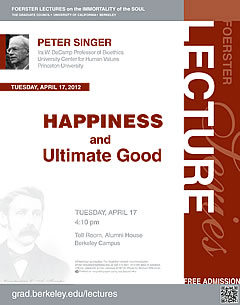
Peter Singer
Ira W. DeCamp Professor of Bioethics, University Center for Human Values, Princeton University
Foerster Lectures on the Immortality of the Soul
April 17, 2012 — 4:10 PMAlumni House, Toll Room — UC Berkeley Campus
About the Lecture There is widespread agreement that happiness is good, but is it the sole ultimate good? In his lecture, Singer will explore arguments for and against such a conclusion. He will consider the implications for public policy that … Continued
Alumni House, Toll Room - UC Berkeley Campus Berkeley Graduate Lectures [email protected] false MM/DD/YYYYAbout the Lecture
There is widespread agreement that happiness is good, but is it the sole ultimate good? In his lecture, Singer will explore arguments for and against such a conclusion. He will consider the implications for public policy that take happiness as one of the most important goods that individuals can achieve.
About Peter Singer
Peter Singer specializes in applied ethics, approaching ethics from a secular preference utilitarian perspective. He has written widely, and is perhaps best known for the book Animal Liberation (1975), widely regarded as the touchstone of the animal liberation movement. His views on animal rights and other issues in bioethics have attracted attention and a degree of controversy. In Rethinking Life and Death: The Collapse of Our Traditional Ethics (1994), Singer examines the ethical dilemmas of modern medicine, and covers the value of human life, abortion, and other controversial questions.
Singer’s most recent book, The Life You Can Save: Acting Now to End World Poverty (2009), makes the argument that it is a clear-cut moral imperative for citizens of developed countries to give more to charitable causes that help the poor. His current project is a book tentatively entitled Sidgwick and Contemporary Ethics. In it, Singer reviews the utilitarian philosopher Henry Sidgwick’s 19th century masterpiece, The Methods of Ethics to show how Sidgwick’s ideas can be relevant to contemporary ethics and to make this text more accessible to students and modern ethicists. Voted one of Australia’s ten most influential public intellectuals, In 2005 Singer was included in Time Magazine’s list of the 100 most influential people in the world. He is the Ira W. DeCamp Professor of Bioethics at the University Center for Human Values at Princeton University and laureate professor at the Centre for Applied Philosophy and Public Ethics, University of Melbourne.